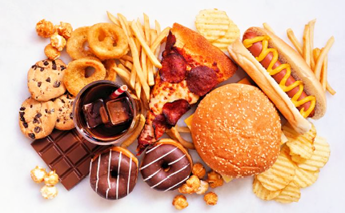Ultra-Processed Foods
Ultra-processed foods (sometimes called highly processed foods) are increasingly common in today’s diet. Unlike minimally processed foods such as fruits, vegetables, or whole grains, these foods are altered so heavily that they become almost unrecognizable from their original form.
Nutrition experts often point out that what was once referred to as junk food now falls under the category of ultra-processed foods, thanks to the use of additives, preservatives, artificial flavorings, and industrial techniques. While these foods are convenient and tasty, research shows that they carry significant health risks when consumed regularly.
 Image courtesy -National Institute of Health
Image courtesy -National Institute of Health
The NOVA Food Classification System
To better understand food processing, researchers at the University of São Paulo, Brazil, developed the NOVA classification system in 2009. It categorizes foods into four groups:
1Unprocessed or Minimally Processed Foods : Fresh fruits and vegetables, beans, nuts, seeds, eggs, plain yogurt, meat, poultry, coffee, and pasta.
2Processed Culinary Ingredients : Sugar, honey, maple syrup, vegetable oils, butter, and vinegar.
3Processed Foods : Salted nuts, cured meats, canned fish or vegetables, most cheeses, and fresh bakery bread.
4Ultra-Processed Foods : Commercial breads, packaged breakfast cereals, processed meats, flavored yogurts, hot dogs, frozen meals, chips, candy bars, and sodas.
So, ultra-processed foods are essentially industrial formulations. They’re made with ingredients you wouldn’t typically use in your kitchen, such as: emulsifiers, artificial colorings, flavor enhancers, bulking agents, and preservatives and stabilizers.
These foods often combine fats, refined starches, sugars, salts, and hydrogenated oils to enhance taste, texture, and shelf life. This makes them not only addictive but also capable of lasting months in your pantry without spoiling.
Why Ultra-Processed Foods Are a Growing Problem
Consumption of ultra-processed foods has surged worldwide. According to the US Centers for Disease Control and Prevention (CDC), Americans now get:
55% of their daily calories from ultra-processed foods
62% of daily calories from ultra-processed foods in children aged 1–18
Health Risks Linked to Ultra-Processed Foods
Research shows a clear dose-response relationship: the more ultra-processed foods you consume, the higher your health risks. A major 2024 review analyzing nearly 10 million people across 45 meta-analyses found that eating just one extra serving per day of ultra-processed food increased the risk of:
50% higher risk of cardiovascular disease–related death
55% higher risk of obesity
41% higher risk of sleep disorders
40% higher risk of type 2 diabetes
20% higher risk of depression
How to Cut Back on Ultra-Processed Foods
Reducing intake of ultra-processed foods can have major health benefits. Here are some practical tips:
Choose whole foods first: Base your meals on fruits, vegetables, whole grains, and lean proteins.
Read labels carefully: Avoid products with long ingredient lists filled with additives.
Cook at home: Preparing meals from scratch reduces reliance on processed ingredients.
Swap snacks: Replace chips and candy with nuts, seeds, or fresh fruit.
Limit sugary drinks: Opt for water, herbal teas, or sparkling water instead of soda.
Keynote
Ultra-processed foods may be convenient and tasty, but they come with serious long-term health risks, from obesity and diabetes to heart disease and depression. By becoming more aware of how much of these foods you consume and making small, sustainable swaps, you can significantly improve your overall health. Medical Disclaimer
Read further on:
≺≺ Snacks: Quality vs. Frequency - What Really Matters for Your Health.
≺≺ What eating strategies work best for losing weight long term?
≺≺ What are the top three minerals you can take to boost memory?
≺≺ Why is regular table salt considered unhealthy?
≺≺ What makes Himalayan salt different from regular table salt?
≺≺ How are artificial sweeteners made?
≺≺ How toxic are the nitrites used in curing processed meats?
≺≺ What health problems are linked to consuming corn syrup?
≺≺ What food is most effective for moderating blood sugar?
≺≺ How Do Sugary Meals and Beverages Harm Dental Health?
≺≺ What Is the Ketogenic Diet? Is the Keto Diet Right for Everyone?
≺≺ What is the Okinawan diet? What is the secret behind Okinawan long life expectancy?
≺≺ EWG's- The Clean Fifteen: Fruits and Vegetables with the Lowest Pesticide Levels.
≺≺ What are antioxidants? How antioxidants in the fruits and vegetables help in preventing cancers and diseases?
≺≺ What foods should people with high blood pressure avoid?
≺≺ How can I reduce the risk of cancer-causing chemicals when cooking or grilling meat?
≺≺ What happens to my blood vessels when I gain weight?
≺≺ What type of exercise is best for lowering my blood sugar?
≻≻ Watch this page for more such informative articles on Health, Nutrition, and Wellness.
≻≻-Back to Home page.
Further reading (External Links opens in new window):
≺≺- CNN Health - Here are good and bad ultraprocessed foods, according to the American Heart Association.
≺≺- Stanford Medicine - Ultra-processed food: Five things to know.